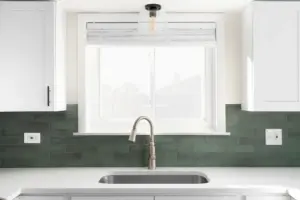How Are Porcelain Countertops Made?
How Are Porcelain Countertops Made?
 When shopping for countertops, you might be considering natural stone like granite or manmade materials like laminate or engineered quartz. A material that is often overlooked is porcelain, but it is a good option, durable and easy to maintain. What is porcelain, though? Let’s take a look at some properties of porcelain, as well as its origin.
When shopping for countertops, you might be considering natural stone like granite or manmade materials like laminate or engineered quartz. A material that is often overlooked is porcelain, but it is a good option, durable and easy to maintain. What is porcelain, though? Let’s take a look at some properties of porcelain, as well as its origin.
Are Porcelain Countertops Man-made?
Porcelain countertops are made of a mix of powdered china stone and white china clay, also called kaolin, heated to 1450°C. The earliest known versions of porcelain existed during the Shang Dynasty and the process of making porcelain matured between the sixth and ninth centuries. Using high temperatures to harden the porcelain makes it very dense and durable, and impurities in the clay add to the strength and color of the porcelain. When porcelain is manufactured for countertops, it is coated with a pigmented glaze, giving it a look similar to natural stone.
Properties of Porcelain Countertops
One advantage of porcelain is that it is heat resistant, so it works well in kitchens, where pots and pans can be set directly on it without damaging it. Porcelain is also stronger than granite and scratch-resistant. It is practically impervious to water, with an absorption rate of less than .5 percent, and it is also non-porous and stain-resistant. Another advantage of porcelain is that it is UV light-resistant, so it won’t be discolored by prolonged, direct exposure to sunlight. Because porcelain is manufactured, it comes in a wide range of colors and patterns, and it can even look like marble, wood grain, or rusted steel. It is a lightweight material that can be installed in different ways, and you can even order extra-large slabs to reduce the number of seams required. Porcelain is also an environmentally sound option, made of 100 percent natural raw and clay-based materials, and fully recyclable.
Drawbacks to Consider
It may seem counterintuitive for a material so strong, but porcelain countertops are easy to crack under blunt force. Just be careful not to hit your countertops with a meat cleaver or hammer, and they should be fine. Another drawback is that, as much as they offer in terms of style, they have limited edge profile options. You can get porcelain countertops in round, beveled, straight, covered, or waterfall, or you can get the edges mitered, to give the look of a thicker slab. Any edges that require significant tapering, however, cannot be done with porcelain, because the patterns and colors do not go all the way through the slab. And, while porcelain is less expensive than granite, marble, or quartz, it can be difficult to fabricate, which can add to its expense.
Call Signature Marble and Granite for New Countertops
Overall, porcelain is a versatile, durable, and high-performance countertop material. For professionally installed countertops, contact the team at Signature Marble and Granite for a free estimate, and we will send a team to you for a more precise consultation. While many companies do not offer porcelain countertops, our team is certified and trained in porcelain installation. Once we’ve installed your gorgeous new countertops, we’ll provide you with a one-year limited warranty, to give you peace of mind. A local Utah company, we take pride in helping you select the perfect countertops that you will enjoy for many years to come. Contact us today for your free estimate and consultation.
